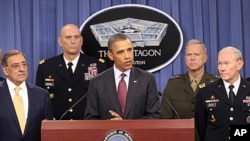President Barack Obama and U.S. defense officials have unveiled the results of a new strategy review to maintain U.S. military superiority with leaner and more efficient forces capable of responding to global challenges.
|
U.S. Defense Priorities |
|
The strategic review was ordered by President Obama last year to help guide Pentagon decision-making and setting of priorities in an atmosphere of budget austerity, and sharp partisan debate over deficits and debt.
In recognition of its significance, Obama appeared with Secretary of Defense Leon Panetta and the military Joint Chiefs of Staff Chairman Martin Dempsey as the results were formally announced at the Pentagon.
Obama pointed to the end of U.S. combat operations in Iraq, the drawing down of forces from Afghanistan, the killing of Osama bin-Laden, and the successful NATO operation in Libya. He said these have brought the United States to a moment of transition.
"As we look beyond the wars in Iraq and Afghanistan, and the end of long-term, nation-building with large military footprints, we will be able to ensure our security with smaller conventional ground forces," said the president. "We will continue to get rid of outdated Cold War-era systems so that we can invest in the capabilities we need for the future, including intelligence, surveillance and reconnaissance; counter terrorism; countering weapons of mass destruction; and the ability to operate in environments where adversaries try to deny us access."
Related video report by Luis Ramirez
Obama said military forces will be "agile, flexible and ready for the full range of contingencies and threats." The U.S. presence in the Asia-Pacific region will be strengthened, and Obama said, as he did in Australia in November, that reductions "will not come at the expense of this critical region."
Secretary Panetta said the new strategy is aimed at cutting defense spending in a balanced way by about $487-billion over 10 years, but should not mean a choice between national security and fiscal responsibility.
Panetta said a "smaller, ready and well-equipped" joint force would focus on the Pacific, and the Middle East.
"This region is growing in importance to the future of the U.S. economy and our national security,' he said. "This means, for instance, improving capabilities that maintain our military's technological edge and freedom of action. At the same time, the U.S. will place a premium on maintaining our military presence and capabilities in the broader Middle East."
Panetta said the U.S. military must be able to fight in several conflicts at the same time, and "confront and defeat more than one adversary at a time."
|
John Blaxland, Senior Fellow at the Australian National University's Strategic and Defense Center, discusses the impact of U.S. military budget cuts:
|
Joint Chiefs of Staff Chairman Dempsey was asked by a reporter what message the results of the defense review would send to Iran.
"The message that we have had consistently for Iran is that we expect them to be a responsible member of the community of nations, not deny freedom of navigation, freedom of movement, freedom of access, and we are determined that they will not acquire a nuclear weapon," he said.
In his remarks, President Obama said details would be emerging in coming weeks.
"I would encourage all of us to remember what President Eisenhower once said. That “each proposal must be weighed in the light of a broader consideration: the need to maintain balance in and among national programs.” After a decade of war, and as we rebuild the source of our strength, at home and abroad, it is time to restore that balance," he said.
Obama said the U.S. defense budget will grow more slowly over the next 10 years, but it will meet U.S. global responsibilities.
Asked about force reductions in specific areas, such as Europe, Secretary Panetta said the United States will maintain commitments to Europe, and Joint Chiefs Chairman Dempsey said the countrty will always act on the foundation of traditional strategic partnerships, such as NATO.




